IMAGES COURTESY OF: TEAM SAUERLAND & KEVIN ZESLING
When the cackling of loud teenage girls echoes down the hallway, discussing schoolwork or their latest overinflated gossip, it’s a stark reminder that they are in fact, young.
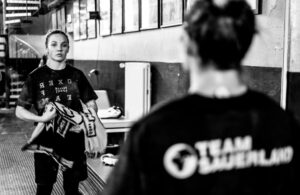
Although maturing far quicker than the opposite sex, they still have to battle adolescence, finding things out about themselves at almost every juncture. I say that based on my own deafening experience, as an older brother to two sisters. Fighting in our home was always more ‘Cold War’ than ‘Rumble in the Jungle’.
Tackling exams; making crucial decisions about their futures and almost daily changing opinions on a host of issues afforded to those approaching adulthood – it’s not an easy gig. *Add to that the gruelling sessions spent in male-dominated gyms, preparing for combat, punching leather with leather, sweating, bleeding, resting and performing.
Okay, not everyone has to experience those* things. But for teenage, German prodigy Sophie Alisch (3-0, 1KOs), it’s boxing that dominates her thoughts as we catch up, exclusively for Boxing Social.
Despite still being in the throes of her teenage years and having only signed professional papers earlier this year, with her debut this past February, Alisch has been turning heads with her recent outings, signposting herself as an exciting female fighter inked to Team Sauerland on a promotional deal.
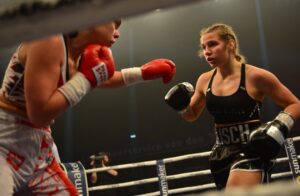
She is currently managed by her father, Michael, who she affectionately describes as her ‘best friend’ and the pair have been on their journey through boxing for longer than most of her peers in the paid ranks. As she explained though, her involvement in sport at the highest level didn’t always involve punching older women in the face. It wasn’t always this much fun.
“I was a junior tennis player and things went very well for me” explained Alisch, “I grew up in Kitzbühel, Austria in the Tirolian Alps and very quickly I was ordered into the Austrian junior prospect team. When we moved back to Berlin/Germany my father took me to a boxing gym, for some additional sports and I fell in love with it. My mother then started to tell my father that I would like to quit tennis and start all over with boxing.”
“I can tell you that my father was nervous. That’s how I came to boxing. I started boxing four years ago, after five months of training, I went to the National Junior Championships with an [age] exception approval, as I was only thirteen-years of age and lost the final against a very experienced and multiple-time German champion, in a close fight.”
Continuing to progress rapidly beyond her years, it would soon become apparent that Alisch had an exceptionally promising career in this sport, in particular. Her performances as an amateur were unheard of. The German Boxing Federation had allowed her to completely skip the under-seventeen age category, jumping straight into the mix at under-nineteen level, winning the national championships as the youngest ever competitor at that level.
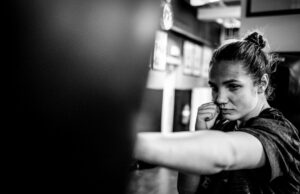
Sophie soon scooped a bronze medal at the European Championships amongst her own age group, before receiving the call to report to the German Olympic camp – once again, the youngest woman in their history to do so.
The uncertainty surrounding the Olympic Games, coupled with a chance meeting with Team Sauerland utility man, Tom Dallas, had turned her head, resulting in a transition to the professional ranks. At the beginning of 2019, the peak of the unpaid game was her only ambition, but now just five months down the line, she is preparing for her fourth outing under the German company’s banner and continues gaining momentum across all levels of boxing media.
“I’ve been used to this since the amateur times. As an amateur, you fight the big tournaments four or five times per week. In the under-nineteens division, the rounds are three minutes so that’s kind of exhausting and furthermore, you have to weigh in every day and bring your weight [under control]. In general, I can say by now I could fight every weekend.”
She continued, “I could fight every weekend, [but] I think this year around ten fights would be good, it helps me to get educated and continue to get better. The Sauerland events are amazing, superbly organized and the audience is amazing. At my debut, I went through a lot of [different] emotions!”
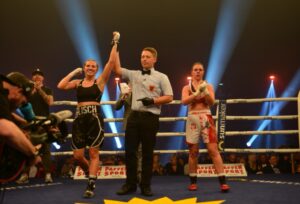
Fighting every week would be a tough sell for the average paying public, despite her willingness to test herself. She’d come along at an exciting time for women’s boxing, fresh off the back of the recent ‘super fight’ between two-time Olympic champion, Claressa Shields and German resident, Christina Hammer.
With two undisputed champions in Shields and Danish role model, Cecilia Braekhus, they could soon find themselves joined by a third when Ireland’s Katie Taylor fights on June 1st.
Although still struggling to headline events, female boxing has taken progressive steps, something that Sophie believes was modelled on the UFC’s introduction of a women’s division. The global success of stars such as Ronda Rousey, for example, had opened the eyes of casual fans to something they’d previously felt indifferent about. Alisch was clear when asked about the fighters she looked up to, naming the Irish icon as her personal favourite.
“Female boxing has changed with those mentioned fighters, especially [Katie] Taylor and [Claressa] Shields. I also have to mention Chantelle Cameron, Savannah Marshall and Estelle Mossely who are in the professional ranks. These fighters have a superb amateur education and it’s fun to watch from a technical and athletic point of view.
“This is the new generation of female fighters in professional boxing. I think they all did a lot for female boxing in turning professional and putting the new generation of female boxers on the radar for the audience.”
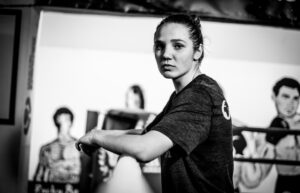
“Katie Taylor is definitely my favourite, I like her a lot inside and outside the ring. She’s fast and throws a lot of combinations and she’s humble, such a good character and role model. She’s my favourite fighter and maybe it’s also because of the similarities we have, as my father went almost the same way with me regarding training philosophy etc. than she went with her father, Pete.”
The strength of her relationship with father Michael, was refreshing, as he continues to navigate her steady path to titles. Alisch Sr is also responsible for German light-heavyweight, Fabian Thiemke, undefeated with two knockouts from his first two contests. The Alisch family were entirely invested in her fledgling career, each assuming their roles, with all hands on deck from the beginning.
Boxing may not have been their plan for Sophie originally, but they were throwing their weight behind the exciting athlete. I was interested to hear of the involvement of her younger sister, bringing her into the set-up in order to keep the family unified as she handles her business between the ropes. The Alisch camp was the Alisch family – an original concept.
“Well, my father is my best friend, [my most] trusted person and at least helps me to make the right decisions, [so] that I can fully concentrate on my professional sports career. He manages me and some other talented fighters who were very successful amateur boxers and he has helped them to turn professional.”
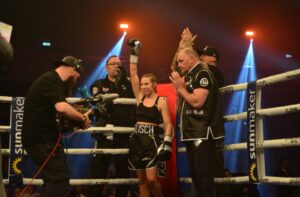
“I can say that I really have and had a beloved childhood, without any struggles. My mother also plays the main role as she keeps everything together and she’s the best cook I can wish for! My younger sister Mia is also involved and takes care of everything that happens around me. Our plan is to involve her more when she’s done with school.”
Chasing a fourth victory in the coming months, the seventeen-year old was focused on taking female boxing to the next level. I put it to her that, in having ten fights in a year, she could propel herself into world title contention, climbing the rankings with every contest in an already diluted featherweight landscape. With no official date pencilled in, she was ticking over in the gym, waiting for her father’s phone to ring, with Team Sauerland scouting future opponents.
Champions within her division include American Heather Hardy and fellow German, Elina Tissen. There are just over one hundred fighters at the time of writing, in the featherweight rankings, with Sophie already sitting at number fifty-four. Could she become the youngest female world champion in history? She’d have to achieve it quicker than Trinidad and Tobago native, Giselle Salandy, who won the title at nineteen-years and nine months old, back in 2006 before tragically dying at the age of twenty-one.
For Sophie Alisch, breaking records was second nature – you wouldn’t bet against her.
“Yes, I thought about it” she answered, “Although it will still be a long, tough road. I would love to leave a legacy behind and of course, I want to be youngest world champion ever in female boxing history. This would be massive. Boxing with Sophie Alisch means dynamic and lightning fast combinations.
“I think we are on the way, especially with the new generation of female fighters. Young, hungry, technically and physically strong. Women’s boxing should be never compared to men’s boxing, I think that’s the main mistake, you also don’t compare men’s tennis to women’s tennis – it’s a different sport”
Interview written by: Craig Scott
Follow Craig on Twitter at: @craigscott209